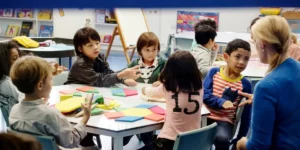In today’s tech-driven world, one old-fashioned idea still holds incredible power in education: “strong communication between teachers and parents”. When parents and teachers work together, students don’t just do better academically, they become more motivated, engaged, and confident learners.
Let’s explore how simple, consistent, and meaningful communication between home and school can transform a child’s learning journey.
The Link Between Communication and Student Drive
1. A Shared Support System
Regular communication between teachers and parents creates a good support system for the student. This collaboration fosters a sense of stability and belonging for children, as they witness the dedication of both their teachers and parents towards their development. This, in turn, enhances their confidence and motivates them to strive for excellence.
2. Setting Clear, Consistent Expectations
Students feel more secure and focused when expectations at home match what’s being asked at school. Regular communication ensures that both parties are aligned, making rules and goals more effective.
3. Personalizing the Learning Experience
A student who feels understood and supported is more likely to engage. When teachers learn about a student’s strengths, challenges, or interests from parents, they can tailor instruction in ways that spark curiosity and build motivation.
4. Positive Reinforcement Boosts Motivation
By providing parents with positive feedback from teachers, such as recognizing effort, creativity, or progress, families can support and reinforce these messages at home, allowing them to take pride in their achievements and gain a sense of purpose in their educational endeavours.
How Communication can Boost Student Engagement?
- Fostering Accountability
When students are aware that their teachers and parents are consistently communicating and sharing updates, they are more inclined to remain focused on their assignments, progress, and participation.
- Providing Support in Challenging Times
Education is not always a seamless journey. However, when a child witnesses the unwavering support from both their teacher and parent during their difficult times, they are more likely to overcome obstacles.
- Encouraging Engagement Beyond Education
Involved parents motivate their children to engage in extracurricular activities beyond the traditional classroom setting, such as sports and arts. This not only strengthens their emotional bond with the school but also their personal growth.
Real-World Results
Studies show that students whose parents are actively engaged through teacher communication complete homework more consistently, have better classroom behavior, show more interest in learning, and are less likely to be absent. One notable study from Harvard found that simple weekly text messages from teachers to parents about student performance led to higher homework completion and reduced failure rates.
Key Statistics:
- Schools that implement family engagement programs experience a 15% decrease in behavioral problems
- Students with involved parents have 98% average school attendance, a strong predictor of academic success
- Parent involvement during middle school increases the likelihood of graduating high school by 25%.
- 78% of teachers acknowledge that parental involvement positively influences student motivation.
Overcoming Communication Challenges:
While communication is crucial, it can often be challenging and ineffective. Common barriers include language differences, limited time for busy families, over-reliance on digital tools, parents feeling intimidated or unsure of how to engage.
To overcome these, schools and teachers can:
- Use clear and accessible language to ensure easy understanding for all parties involved
- Offer multiple ways of communication via phone, email, in-person, messaging apps
- Schedule regular check-ins, not just when problems arise
- Include student voices in discussions to ensure their perspectives are heard and considered in the communication process
Conclusion
Strong communication between teachers and parents fosters a sense of support, value, and understanding for students. This emotional connection drives increased motivation, enhanced engagement, and ultimately, a more successful and enjoyable academic journey. Whether through an email, meeting, or text update, every form of connection is valuable and can make a significant impact on a child’s life.





